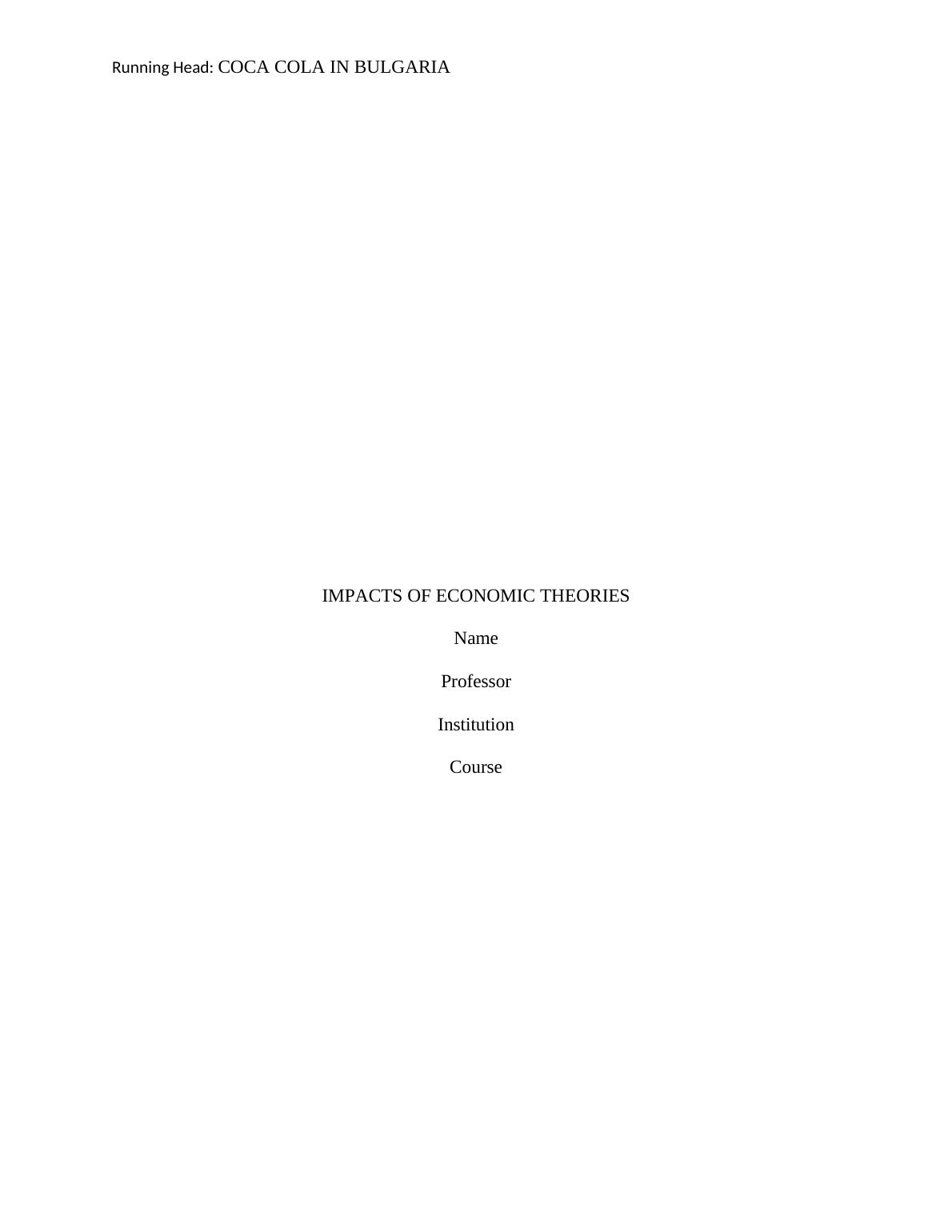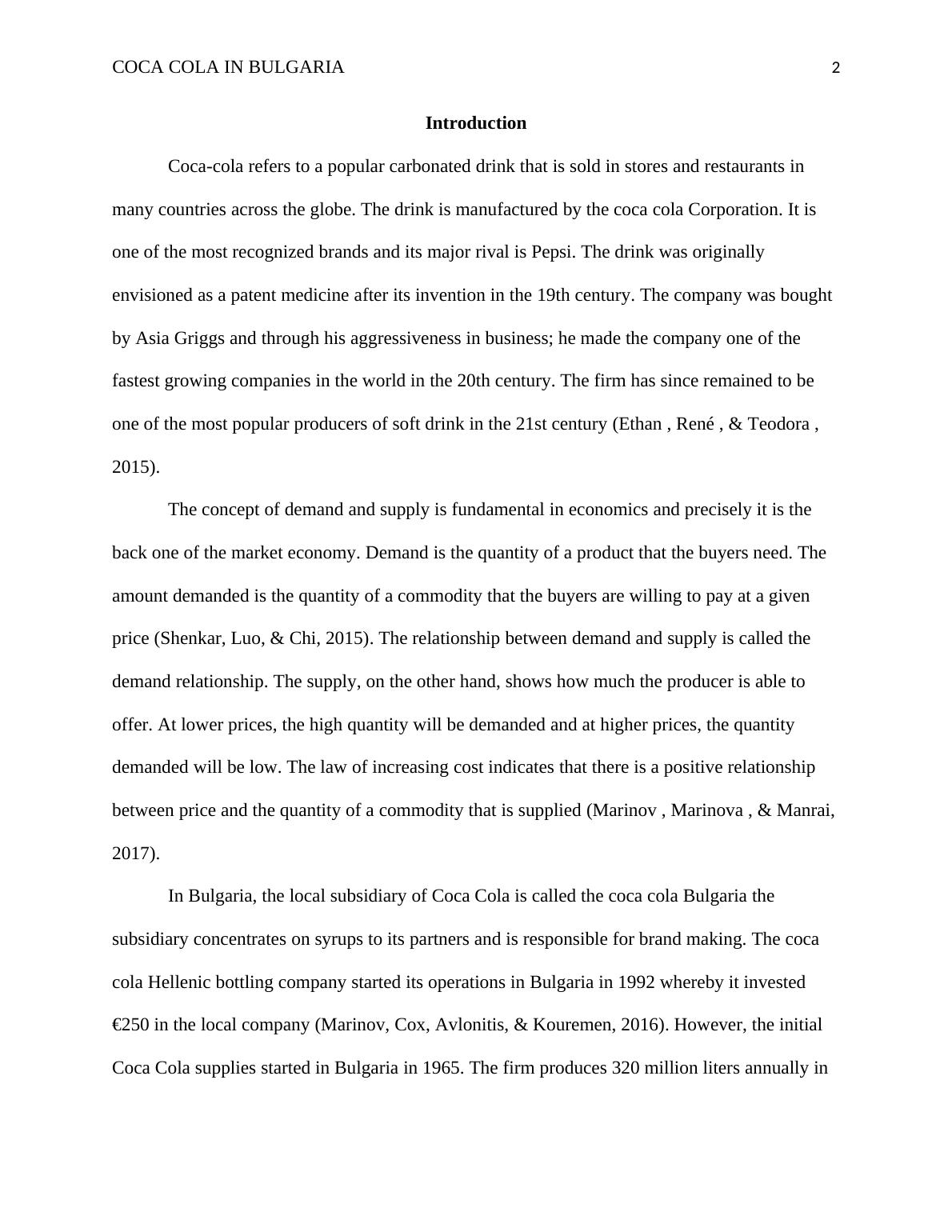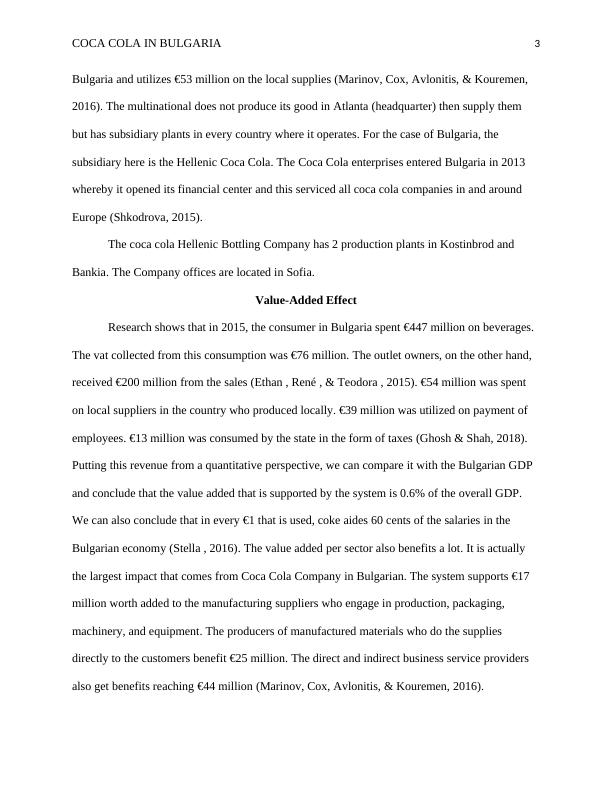Impacts of Economic Theories on Coca Cola in Bulgaria
Added on 2023-03-17
6 Pages1460 Words62 Views
Running Head: COCA COLA IN BULGARIA
IMPACTS OF ECONOMIC THEORIES
Name
Professor
Institution
Course
IMPACTS OF ECONOMIC THEORIES
Name
Professor
Institution
Course

COCA COLA IN BULGARIA 2
Introduction
Coca-cola refers to a popular carbonated drink that is sold in stores and restaurants in
many countries across the globe. The drink is manufactured by the coca cola Corporation. It is
one of the most recognized brands and its major rival is Pepsi. The drink was originally
envisioned as a patent medicine after its invention in the 19th century. The company was bought
by Asia Griggs and through his aggressiveness in business; he made the company one of the
fastest growing companies in the world in the 20th century. The firm has since remained to be
one of the most popular producers of soft drink in the 21st century (Ethan , René , & Teodora ,
2015).
The concept of demand and supply is fundamental in economics and precisely it is the
back one of the market economy. Demand is the quantity of a product that the buyers need. The
amount demanded is the quantity of a commodity that the buyers are willing to pay at a given
price (Shenkar, Luo, & Chi, 2015). The relationship between demand and supply is called the
demand relationship. The supply, on the other hand, shows how much the producer is able to
offer. At lower prices, the high quantity will be demanded and at higher prices, the quantity
demanded will be low. The law of increasing cost indicates that there is a positive relationship
between price and the quantity of a commodity that is supplied (Marinov , Marinova , & Manrai,
2017).
In Bulgaria, the local subsidiary of Coca Cola is called the coca cola Bulgaria the
subsidiary concentrates on syrups to its partners and is responsible for brand making. The coca
cola Hellenic bottling company started its operations in Bulgaria in 1992 whereby it invested
€250 in the local company (Marinov, Cox, Avlonitis, & Kouremen, 2016). However, the initial
Coca Cola supplies started in Bulgaria in 1965. The firm produces 320 million liters annually in
Introduction
Coca-cola refers to a popular carbonated drink that is sold in stores and restaurants in
many countries across the globe. The drink is manufactured by the coca cola Corporation. It is
one of the most recognized brands and its major rival is Pepsi. The drink was originally
envisioned as a patent medicine after its invention in the 19th century. The company was bought
by Asia Griggs and through his aggressiveness in business; he made the company one of the
fastest growing companies in the world in the 20th century. The firm has since remained to be
one of the most popular producers of soft drink in the 21st century (Ethan , René , & Teodora ,
2015).
The concept of demand and supply is fundamental in economics and precisely it is the
back one of the market economy. Demand is the quantity of a product that the buyers need. The
amount demanded is the quantity of a commodity that the buyers are willing to pay at a given
price (Shenkar, Luo, & Chi, 2015). The relationship between demand and supply is called the
demand relationship. The supply, on the other hand, shows how much the producer is able to
offer. At lower prices, the high quantity will be demanded and at higher prices, the quantity
demanded will be low. The law of increasing cost indicates that there is a positive relationship
between price and the quantity of a commodity that is supplied (Marinov , Marinova , & Manrai,
2017).
In Bulgaria, the local subsidiary of Coca Cola is called the coca cola Bulgaria the
subsidiary concentrates on syrups to its partners and is responsible for brand making. The coca
cola Hellenic bottling company started its operations in Bulgaria in 1992 whereby it invested
€250 in the local company (Marinov, Cox, Avlonitis, & Kouremen, 2016). However, the initial
Coca Cola supplies started in Bulgaria in 1965. The firm produces 320 million liters annually in

COCA COLA IN BULGARIA 3
Bulgaria and utilizes €53 million on the local supplies (Marinov, Cox, Avlonitis, & Kouremen,
2016). The multinational does not produce its good in Atlanta (headquarter) then supply them
but has subsidiary plants in every country where it operates. For the case of Bulgaria, the
subsidiary here is the Hellenic Coca Cola. The Coca Cola enterprises entered Bulgaria in 2013
whereby it opened its financial center and this serviced all coca cola companies in and around
Europe (Shkodrova, 2015).
The coca cola Hellenic Bottling Company has 2 production plants in Kostinbrod and
Bankia. The Company offices are located in Sofia.
Value-Added Effect
Research shows that in 2015, the consumer in Bulgaria spent €447 million on beverages.
The vat collected from this consumption was €76 million. The outlet owners, on the other hand,
received €200 million from the sales (Ethan , René , & Teodora , 2015). €54 million was spent
on local suppliers in the country who produced locally. €39 million was utilized on payment of
employees. €13 million was consumed by the state in the form of taxes (Ghosh & Shah, 2018).
Putting this revenue from a quantitative perspective, we can compare it with the Bulgarian GDP
and conclude that the value added that is supported by the system is 0.6% of the overall GDP.
We can also conclude that in every €1 that is used, coke aides 60 cents of the salaries in the
Bulgarian economy (Stella , 2016). The value added per sector also benefits a lot. It is actually
the largest impact that comes from Coca Cola Company in Bulgarian. The system supports €17
million worth added to the manufacturing suppliers who engage in production, packaging,
machinery, and equipment. The producers of manufactured materials who do the supplies
directly to the customers benefit €25 million. The direct and indirect business service providers
also get benefits reaching €44 million (Marinov, Cox, Avlonitis, & Kouremen, 2016).
Bulgaria and utilizes €53 million on the local supplies (Marinov, Cox, Avlonitis, & Kouremen,
2016). The multinational does not produce its good in Atlanta (headquarter) then supply them
but has subsidiary plants in every country where it operates. For the case of Bulgaria, the
subsidiary here is the Hellenic Coca Cola. The Coca Cola enterprises entered Bulgaria in 2013
whereby it opened its financial center and this serviced all coca cola companies in and around
Europe (Shkodrova, 2015).
The coca cola Hellenic Bottling Company has 2 production plants in Kostinbrod and
Bankia. The Company offices are located in Sofia.
Value-Added Effect
Research shows that in 2015, the consumer in Bulgaria spent €447 million on beverages.
The vat collected from this consumption was €76 million. The outlet owners, on the other hand,
received €200 million from the sales (Ethan , René , & Teodora , 2015). €54 million was spent
on local suppliers in the country who produced locally. €39 million was utilized on payment of
employees. €13 million was consumed by the state in the form of taxes (Ghosh & Shah, 2018).
Putting this revenue from a quantitative perspective, we can compare it with the Bulgarian GDP
and conclude that the value added that is supported by the system is 0.6% of the overall GDP.
We can also conclude that in every €1 that is used, coke aides 60 cents of the salaries in the
Bulgarian economy (Stella , 2016). The value added per sector also benefits a lot. It is actually
the largest impact that comes from Coca Cola Company in Bulgarian. The system supports €17
million worth added to the manufacturing suppliers who engage in production, packaging,
machinery, and equipment. The producers of manufactured materials who do the supplies
directly to the customers benefit €25 million. The direct and indirect business service providers
also get benefits reaching €44 million (Marinov, Cox, Avlonitis, & Kouremen, 2016).

End of preview
Want to access all the pages? Upload your documents or become a member.
